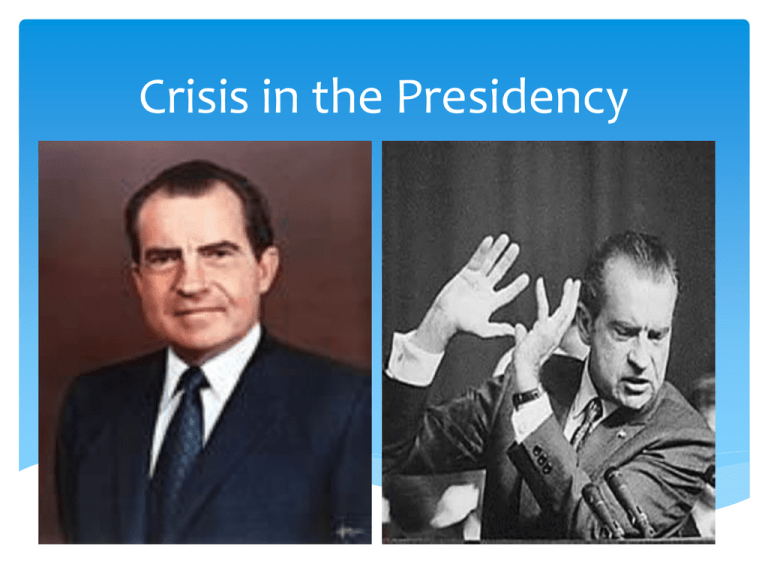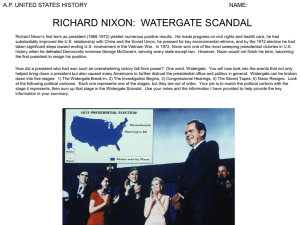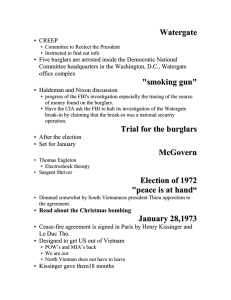Crisis in the Presidency
advertisement

Crisis in the Presidency The Nixon White House Ignored the Constitution 1. Impounded funds 2. U.S. troops invaded Cambodia 3. Released patient records of Daniel Ellsberg – Pentagon Papers 4. Nicknamed “Imperial Presidency” – “King Richard” Nixon made his reputation in the 1940s by hounding alleged communists (Alger Hiss) surrounded himself with trusted and loyal aides “palace guard” – H.R. Haldeman (chief of staff) and John Ehrlichman Erlichman and Haldeman 1971 – orders Chuck Colson to put together “enemies list” – 200 people – 18 organizations a. mostly liberals b. all black leadership in the House After invasion of Cambodia: FBI, CIA, NSA, DIA, IRS work together to combat anti-war movement Goal: break into homes and offices to find info to discredit or blackmail Nixon’s critics CREEPs CREEP – Committee to Re-elect the President 1. run by John Mitchell – former Attorney General 2. raised massive amounts of illegal funds – some went to the “dirty tricks” campaign 3. G. Gordon Liddy – came up with the idea to break into the Dem. National Headquarters a. copy documents b. bug phones c. keep tabs on Dem. election strategy d. offices located at the Watergate complex CREEPs John Mitchell G. Gordon Liddy Unraveling Watergate – June 1972 Washington Post learns 2 of the burglars were members of CREEP 1. burglars had been paid by CREEP funds (anti-Castro Cuban refugees, ex-CIA and FBI agents) 2. Watergate only one of many illegal activities planned and paid for by CREEP Watergate Burglars Frank Wills – Watergate Security October 10, 1972 Washington Post asserts Watergate was part of a massive campaign of political spying and sabotage Nixon worked hard to bury the story 1972 election – only 48% of Americans had heard of Watergate Washington Post Bob Woodward Carl Bernstein Watergate Trial – early 1973 Judge John J. Sirica Watergate burglars go on trial James McCord writes a letter to Sirica a. Whitehouse lied about involvement b. pressured burglars to plead guilty and remain silent April 1973 – Ehrlichman, Dean, Haldeman all resign Whitehouse counsel John Dean testifies that there was a cover-up and Nixon approved it Key Witnesses James McCord John Dean Tapes – Alexander Butterfield Nixon had bugged his own office was ordered to turn them over – claims executive privilege tries to get Cox (special prosecutor) fired finally turns over “edited” tapes – many gaps U.S. v. Nixon – Nixon has to turn over unedited tapes Move for Impeachment – July 30, 1974 Obstructing Justice Violating rights of U.S. citizens Defying Congress – Perjury 1. tapes proved Nixon knew everything 2. August 7, 1974 – resigned from office Farewell – “I am not a crook” Aftermath Gerald Ford becomes President Congress enacts laws to curb Presidential power 1. Privacy Act 2. War Powers Act 3. Federal Election Campaign Act – limits on contributions 31 Nixon administration officials go to jail Ford pardoned Nixon threatened the foundation of American democracy Vietnam, Watergate undermined the nation’s self-confidence – Created Credibility Gap


